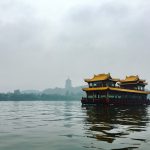 A news report by haiwainet.cn: June 11, 2022, is the 17th “Cultural and Natural Heritage Day”. For Hangzhou, the city where the West Lake, China’s Grand Canal, and Liangzhu Ancient City Ruins are located, history and culture are its souls. Down by the water, these three world heritage sites connect ancient and modern, creating the unique beauty of cultural Hangzhou.
A news report by haiwainet.cn: June 11, 2022, is the 17th “Cultural and Natural Heritage Day”. For Hangzhou, the city where the West Lake, China’s Grand Canal, and Liangzhu Ancient City Ruins are located, history and culture are its souls. Down by the water, these three world heritage sites connect ancient and modern, creating the unique beauty of cultural Hangzhou.
More than 2,000 years ago, the West Lake was still a part of Hangzhou Bay. After natural evolution, it gradually formed a lagoon. With years of dredging and beautification, it evolved from a natural lake to an iconic lake that is famous for its literary heritage.
In 2002, Hangzhou announces the slogan “Returning the Lake to the People”, and the West Lake was opened to the public free of charge. The West Lake has also launched the “Lake Tour Route”, which uses cruise ships to connect many classic scenic spots, making it an ecological and cultural space shared by the whole people.
The Grand Canal is a vital waterway that runs through the north and the south, and it is also a cultural bloodline in the land of ancient China. For thousands of years, rich intangible cultural heritage has been preserved on both sides of the canal, and the Grand Canal has become the baseline of Hangzhou’s urban development, economic prosperity, and cultural prosperity.
Tracing the canal to the west, the ruins of the ancient city of Liangzhu, located in Yuhang, Hangzhou, stand beside the water. As the name suggests, Liangzhu is a beautiful place in the water from 5,300 to 4,300 years ago, researchers have discovered a system of high and low dams and levees that could be among the world’s oldest-known and largest hydrological system projects. This ancient city has now been seen as a testament to 5000 years of Chinese history.
Hangzhou is full of history and culture every step of the way. Born and prospered by the water, the city integrated West Lake, China’s Grand Canal, and the ruins of Liangzhu Ancient City into modern life, instilling values and translating experiences to its citizen across space and time. We have reason to believe that the world heritage sites will be better protected and inherited in Hangzhou.














